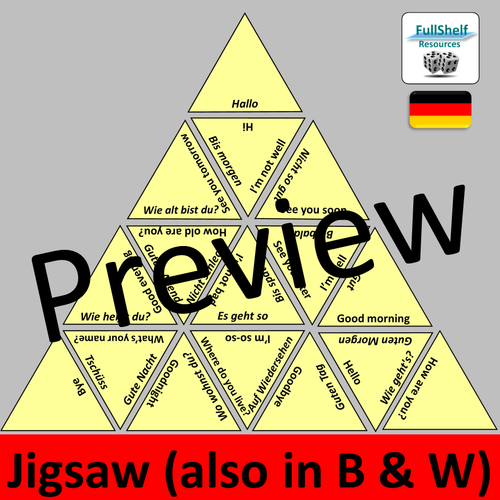




German Greetings and Introductions unit printable games for speaking and reading practice: loop games, a jigsaw puzzle, and an active card game to review basic greetings (Die Begrüßungen auf Deutsch), goodbyes and introducing yourself in German. These activities review vocabulary such as Guten Tag (Hello), Guten Abend (Good evening), Auf Wiedersehen (Goodbye) and Bis später (See you later). Students will also practise asking and answering questions such as Wie geht’s? (How are you?), Wie heißt du? (What’s your name?), Wie alt bist du? (How old are you?), and Wo wohnst du? (Where do you live?). The games are in PDF format.
My German basics resources are made for students beginning German and near beginners in KS2 or early KS3 (Years 5, 6 and 7) and equivalents but may suit others, depending on experience.
SAVE by purchasing this as part of my German Greetings and Introductions BUNDLE, along with these further 4 resource packs:
German Greetings and Introductions Presentation and Activities
German Greetings Worksheets
German Greetings Board Game
German Greetings Role-Play Cards
LOOP GAMES / “I HAVE…WHO HAS…?”
The six 10-card loop games are coloured differently. If printing in black and white use different coloured card to help keep them separate. Designed for oral practice in small groups, with a student reading out the English word or phrase on their card and others checking if they have the German translation, then reading this out - and so on until the loop is completed.
JIGSAW PUZZLE
A 16-piece triangle puzzle. Print, laminate, and cut. Students must arrange the puzzle pieces so that English vocabulary is placed beside the matching German translations on other pieces, forming a large triangle.
ACTIVE CARD GAME
A fun game to get students moving around the classroom, speaking German to each other. 18 identical pairs of cards form a complete 36-card set. Print and laminate the cards. Students circulate, asking and answering questions in German about name, age, and where they live, in whatever order they wish. Students’ responses should be based on the information on their card. Without looking at each other’s card, students try to find the player whose card matches their own.
To make the small number of locations printed on the cards more relevant to students, I have included 3 versions: Canada / US, UK, Australia / NZ. All versions include some German locations.
VOCABULARY SUPPORT CARD
Use this to support certain students, groups or classes to play the games.
Something went wrong, please try again later.
This resource hasn't been reviewed yet
To ensure quality for our reviews, only customers who have purchased this resource can review it
Report this resourceto let us know if it violates our terms and conditions.
Our customer service team will review your report and will be in touch.